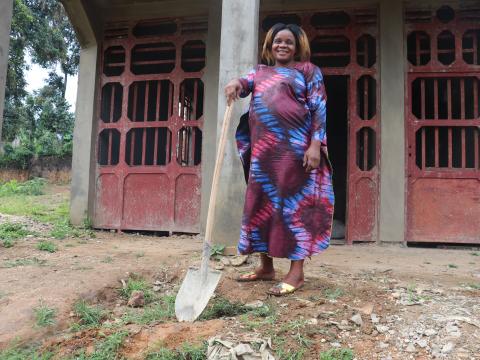Women's leadership: A cornerstone to family stability and local development

Written by Jean Baptiste MIRINDI HAMULI - Social Behaviour change Officer, FSP project
-
Gisèle, a 39-year-old mother of three girls, happily clears the area around her construction site. Feeling involved and gratified, she shows the joy of having recovered her right to participate in the decision-making process in her household. She lives in Kalehe territory where her husband is an agribusinessman.
The sixth daughter of her mother, Gisèle also has several half-brothers. Life was going fine until her ordeal began in the first year of married life. In addition to suffering other abuse, she was excluded from decision-making in family matters.
"I had never known a happy life for the first 19 years of my marriage. All decisions in the home were taken by my husband alone and we lived independent of each other", she explains with regret. This sad reality was a source of precariousness.
The education of Gisèle's children also suffered under a permanent climate of instability in the household, to the point of discrimination developing against certain children, especially girls. For her, equal rights and opportunities were not respected for all her children; only boys benefitted from education.
"My eldest daughter conceived at 17 years of age, largely because of disagreements in my household. I would have tears in my eyes from one day to the next because of this situation", Gisèle says sorrowfully.
In 2019, the couple benefited from the deployment of cross-cutting gender and youth activities of the USAID's Bureau for Humanitarian Assistance (BHA)-funded Food Security Project (FSP)-Enyanya, implemented by World Vision. In these, local groups learned about the importance of attention to gender, gender-based violence, women’s leadership, and the benefits of shared decision-making and joint management of family resources.
Aware of the damage caused over the past years, Symphorien, Gisèle’s husband, regretted all the time he had spent in ignorance and mistreatment of those who should be most precious to him –his wife and children. "I was a delinquent; I considered my wife to be worthless, but World Vision made me a wise and responsible man", he recounts.
Symphorien's account was confirmed by the village chief, Pierre Muhini, who believes that through the couple's actions and achievements, things have improved positively, and their home has evolved. "The husband was difficult to manage, but now this couple has become a model in our village", he explains.
Gisèle is one of the women who have consistently attended the gender trainings, and whose husband has understood their importance. "Thanks to the different lessons of the gender module, which explain the consequences of social norms on shared decision-making and joint management of resources, my life has changed, and my husband is a role model in our village.”
Transformed, her leadership at the local level has led her to be chosen by her peers as Mama Leader, President of the Twende Mbele (let us move forward) Producers' Organisation; of the local Village Savings and Loans Association, Tupendane (let us love one another), and also as treasurer of the Village Committee for Development of Muhongoza village in the centre of Kalehe. She never ceases to show her enthusiasm in these structures supported by FSP-Enyanya.
Gisèle is now highly respected and valued by her husband, and Symphorien appreciates and supports her participation in the management of family finances.
"My joy is extreme; my husband has accepted that I buy a plot of land in my name without him interfering negatively", she exclaims before adding, "he no longer has any doubts when I keep the money, unlike in the past." She recounts this with joy, now that she has a land title from the land registry in her name.
Gisèle now lives a stable life; her family has mobilised funds to construct their house made of sustainable materials, which is close to completion. She encourages other households to follow suit. "We share the gender material in the church and to our neighbours twice a month," she reveals. She is now a change agent that she never imagined she would ever be.
-
The South Kivu FSP Project, known locally as Enyanya, implemented by World Vision in the Kalehe health zone supports USAID's strategic objectives for the Democratic Republic of Congo (DRC) by working with households, community leaders and the DRC Government to improve the food and nutrition security and economic well-being of vulnerable households in South Kivu.